Alibaba, a leading global B2B e-commerce platform, known for its remarkably low prices and vast selection of products.
This affordability has made it a hub for businesses looking to bulk purchases and wholesale deals.
But what sets Alibaba apart in terms of pricing? The secret lies in its unique business model, which capitalizes on factors like low production costs in China, and a streamlined supply chain that connects buyers directly with manufacturers.
However, while the low prices are attractive, they also raise important questions about product quality, reliability, and potential trade-offs.
Are these deals too good to be true? And what should buyers be aware of when shopping on Alibaba? Let’s find out.
How Does Alibaba Work?
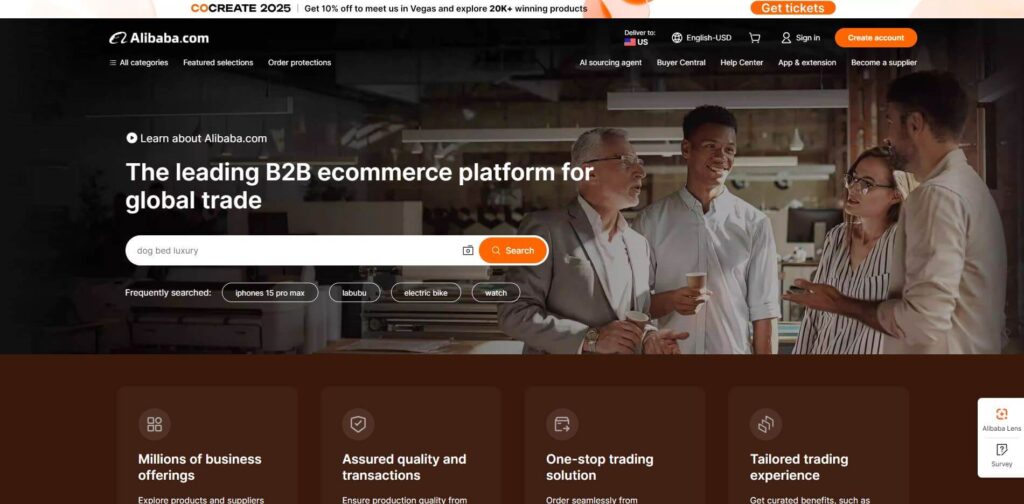
Alibaba is a B2B (business-to-business) marketplace that connects buyers with suppliers, such as manufacturers and wholesalers.
Instead of selling products directly, Alibaba lets suppliers list their products, and buyers can browse, compare, and contact suppliers to make purchases.
Most buyers on Alibaba are businesses looking to order products in bulk. Suppliers often offer discounts for larger orders, making it easier for businesses to source products at lower prices.
To make things easier, Alibaba provides tools like secure payments, trade assurance for safer transactions, and shipping options. However, it’s important for buyers to carefully check the suppliers they’re working with, as not all are verified manufacturers.
In short, Alibaba makes it simple for businesses to find and buy products from suppliers around the world, saving time and money.
7 Reasons Why Alibaba Prices Are So Low
One of the first questions people ask when browsing Alibaba is: “How can everything be this cheap?”
A hoodie for $3. A kitchen knife set for under $5. It almost feels too good to be true, and sometimes, it is.
But there are very real, logical reasons behind those low price tags. Alibaba connects you directly with Chinese suppliers operating in the world’s most competitive manufacturing environment.
Here’s a closer look at why prices are so low, and how that can actually work in your favor.
1. Lower Labor and Manufacturing Costs
Labor costs in China are still much lower than in North America or Europe. In major industrial provinces like Zhejiang or Guangdong, factory workers earn a fraction of what their counterparts do overseas, without compromising output.
And it’s not just about wages. Overhead expenses like rent, utilities, and raw materials are also cheaper due to strong local sourcing and regional production zones. All of that translates into lower production costs, and ultimately, lower prices for you.
2. Factory-Direct Sourcing
Most Alibaba sellers are either manufacturers or trading companies working closely with local factories. That means you’re often skipping multiple layers of distributors, wholesalers, and brand markups.
Take this supplier for example, they’re direct manufacturers with 16 years of industry experience:
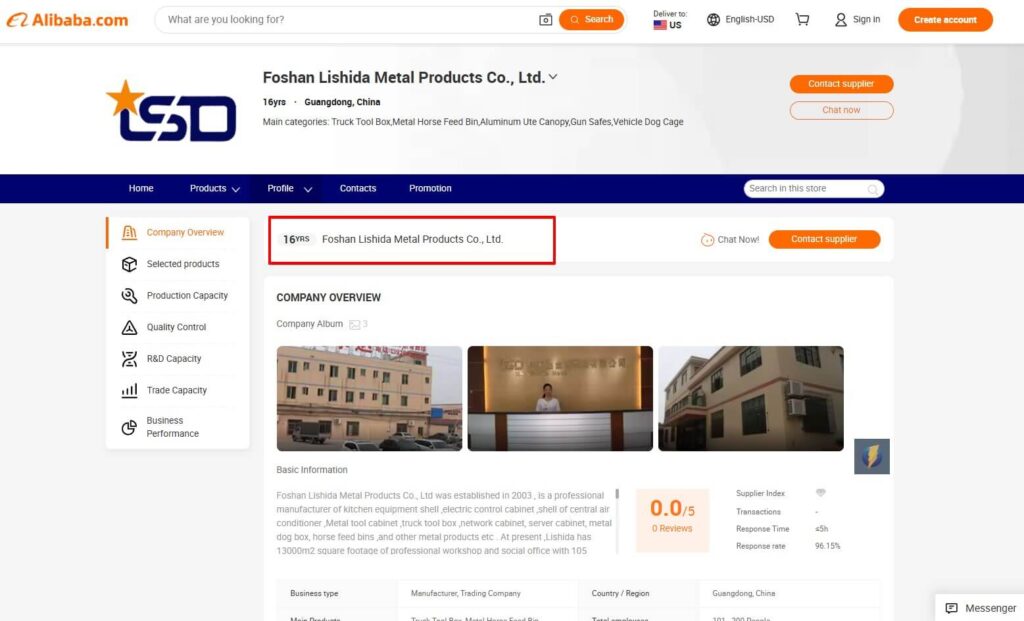
When you deal directly with the source, you don’t just get better pricing, you also have more room to negotiate, customize your order, and build long-term relationships that help your business grow.
3. High-Volume Production = Lower Per-Unit Cost
Chinese factories are built for scale. Whether it’s T-shirts or phone accessories, they often produce thousands of units a day using specialized, automated equipment.
That kind of mass production brings the per-unit price down dramatically, especially when you’re ordering in bulk. You’ll often see prices like:
- $3.50 each for 100 pieces
- $2.50 each for 1,000 pieces
- $1.50 each for 10,000 pieces
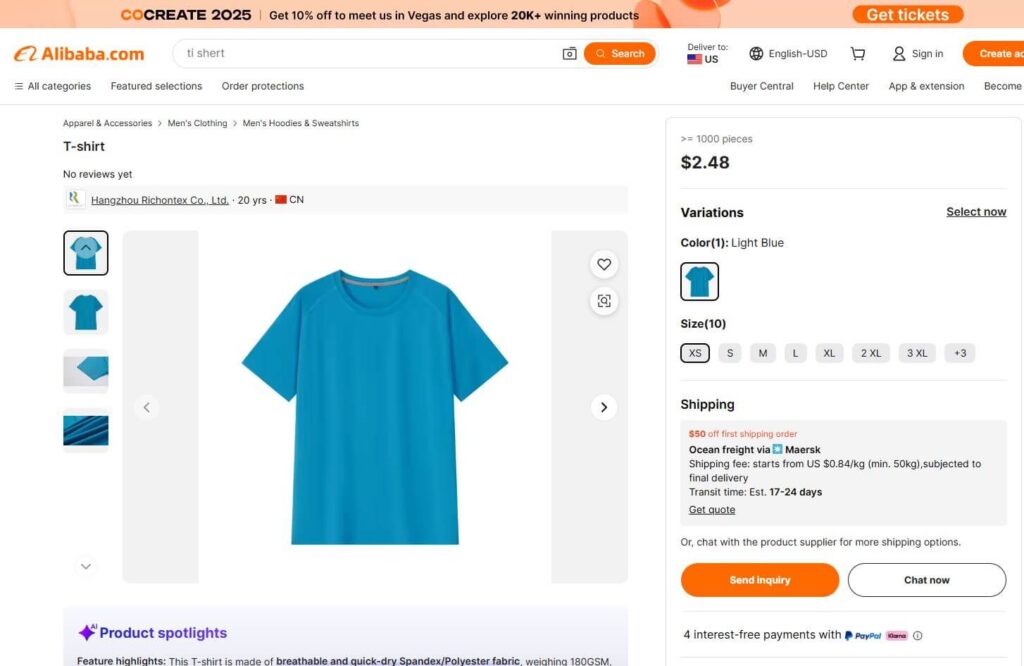
This price drop isn’t a trick, it’s just how economies of scale work.
4. Fierce Competition Among Suppliers
Alibaba is massive. For any given product, you’ll find dozens, if not hundreds, of suppliers offering the same thing. And to stand out, many of them compete aggressively on price.
This often means they’ll:
- Offer lower initial quotes to attract interest
- Undercut competitors just to win your business
- Offer bundle deals, faster shipping, or free samples
It’s a race to the bottom and as a buyer, you can use that to your advantage. Just be sure to vet each supplier carefully before placing a big order.
5. Use of Alternative or Local Materials
Sometimes, the price is low because the materials are different.
A $1.20 ceramic mug may look identical to a $2.50 one, but it might use thinner clay, a lower-grade glaze, or minimal packaging. Many factories use local or generic alternatives that bring costs down but also affect durability and finish.
This doesn’t mean the product is bad, it just means you need to check the specs and request a sample before committing.
6. Advanced Manufacturing Efficiency
China’s factories are not all “cheap labor” sweatshops. Many are highly advanced, with automated machinery, optimized assembly lines, and decades of experience producing the same product category.
A knife factory in Yangjiang might produce 50,000 units a week with minimal variation and near-zero waste.
That kind of process efficiency keeps prices low while still delivering quality, especially for buyers who know what they’re looking for.
7. Government Support for Manufacturing and Exports
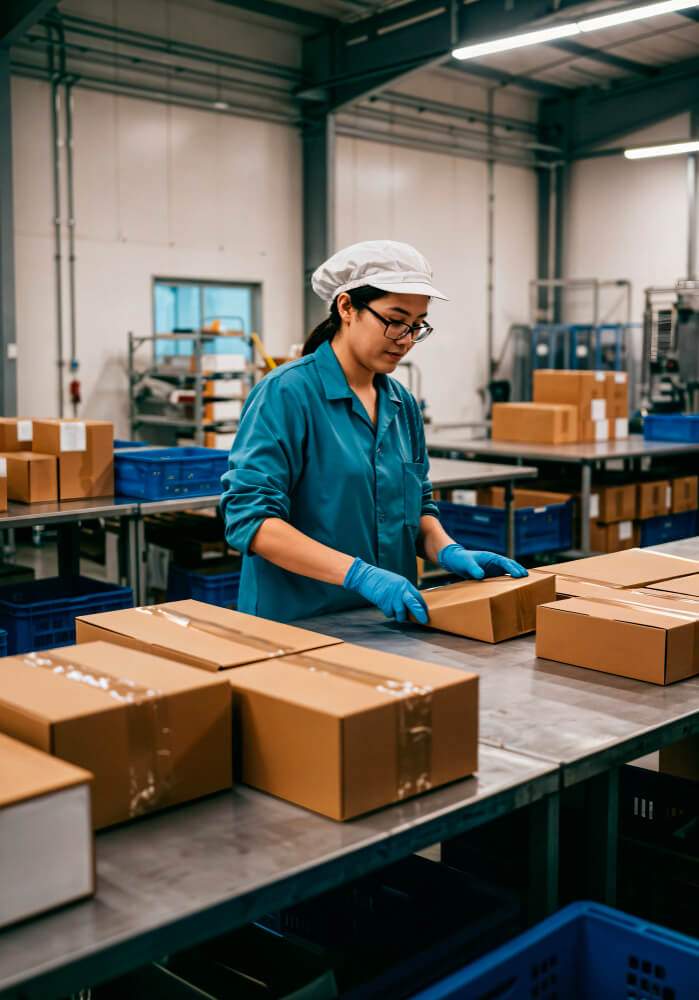
The Chinese government actively supports the country’s export economy. This includes:
- Tax breaks for exporters
- Subsidies for shipping and raw materials
- Investment in industrial zones and infrastructure
- Favorable trade policies with many countries
These policies lower costs for suppliers, who can then pass those savings on to you, especially if you’re sourcing regularly or at scale.
Can You Really Find Good Quality on Alibaba?

Yes, you can find quality products on Alibaba, but it requires careful research. Since Alibaba is a marketplace with thousands of suppliers, the quality of products can vary greatly. Some suppliers offer high-quality items, while others may sell cheaper, lower-quality goods.
To find quality products, it’s essential to:
- Check supplier profiles: Look for verified suppliers or those with “Gold Supplier” badges, as they usually meet higher standards.
- Read product reviews: Customer feedback can give you insights into the product’s quality and reliability.
- Request samples: Ordering samples before making a bulk purchase lets you test the product’s quality firsthand.
While there are risks involved, following these steps can significantly reduce the chances of ending up with low-quality or counterfeit products.
How to Negotiate with Suppliers on Alibaba
If you’re new to Alibaba, negotiating might feel intimidating, especially when messaging suppliers overseas. But the truth is, most suppliers expect you to negotiate, especially on larger orders.
The key is to be polite, clear, and informed. Here’s how to do it right.
1. Know What You’re Negotiating For

Price isn’t the only thing you can negotiate. In fact, some of the best value comes from negotiating:
- Lower MOQs (Minimum Order Quantities)
- Better packaging (e.g. custom boxes, inserts)
- Faster production time
- Free or discounted samples
- Improved payment terms
If you’re working with smaller budgets or testing a product, negotiating MOQ and sample deals can make a huge difference.
2. Reach Out Like a Serious Buyer
Suppliers get dozens of vague inquiries every day. Stand out by being direct and professional.
Here’s what to include in your first message:
- Your name and company
- The exact product you’re interested in (with link or SKU)
- Quantity you’re looking to order (even if it’s just an estimate)
- Any customization or packaging needs
- Your target shipping country
Example:
Hi, I’m sourcing [product] for my store based in the US. I’m interested in ordering 300–500 units. Can you share your best price for that quantity, along with shipping cost to the US? I’m also considering custom packaging, so please let me know if that’s available.
3. Compare Multiple Quotes Before You Counter
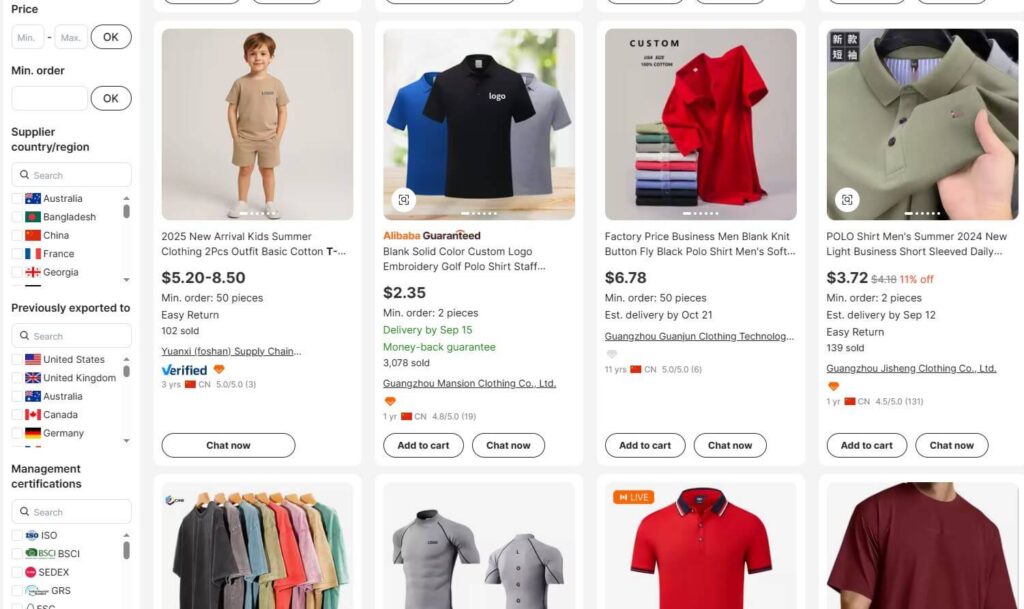
Don’t accept the first offer you get. Contact 5–7 suppliers and compare:
- Price per unit
- MOQ
- Shipping cost and method
- Production time
Once you have a few quotes, you can go back to your preferred supplier with a reasonable counteroffer.
4. Be Clear, But Respectful
You can negotiate, but don’t lowball to the point of being disrespectful. Many suppliers will walk away if they think you’re not serious.
Instead of just saying “too expensive,” try:
“Thanks for the quote. I’ve received a few lower offers around $4.20/unit for 500 pieces. Can you match or come close?”
This keeps things professional while showing that you’ve done your homework.
5. Build a Long-Term Relationship
If the supplier knows you plan to reorder regularly, they’ll be more open to better pricing or terms. Let them know you’re not just a one-time buyer.
“If the first order goes well, I plan to reorder monthly at larger volumes. Let’s make this work.”
6. Use Alibaba Tools to Your Advantage
- RFQ (Request for Quotation): Lets you describe your needs and get quotes from multiple suppliers.
- Trade Assurance: Always opt for it during negotiations. It protects your payment and gives you leverage in case of delays or disputes.
- Alibaba chat: Keep everything documented within the platform, it helps in case you need support.
Final Tip: Be Patient and Stay Professional
Negotiations can take a few days, especially with time zone differences. Don’t rush, and always get the final agreement in writing before placing an order.
Good communication = better deals, fewer misunderstandings, and stronger supplier relationships.
Common Scams on Alibaba and How to Avoid Them
Alibaba offers excellent opportunities for sourcing products, but like any large platform, it’s not immune to scams. Here’s how to buy from Alibaba without getting scammed.
Low-Quality or Counterfeit Products
Some sellers might claim to offer high-quality or branded products but deliver counterfeit or poorly made goods instead. This is especially common with electronics, clothing, and branded items.
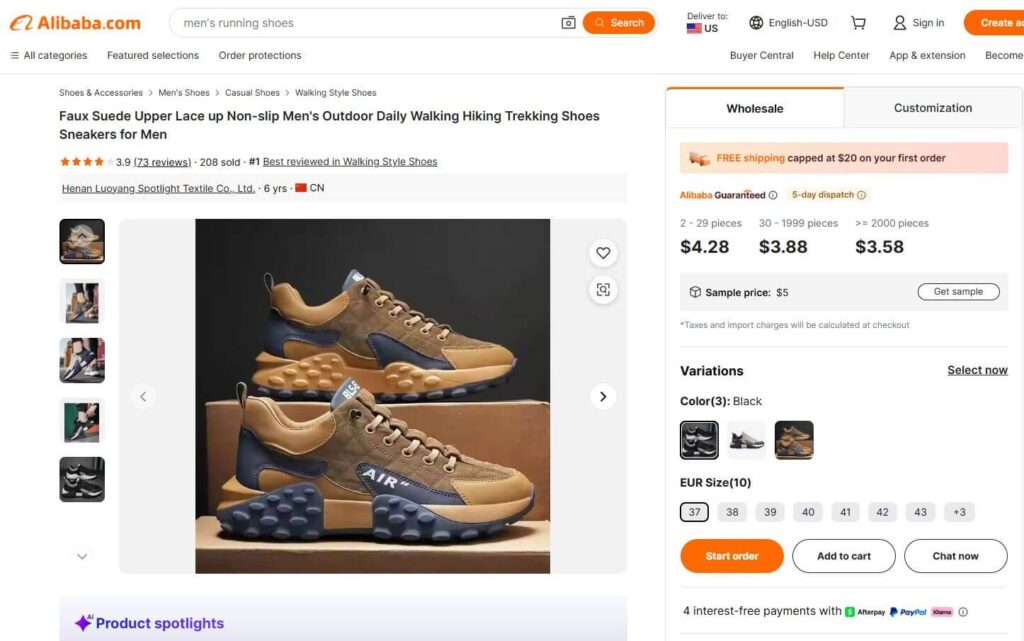
How to Avoid This Scam:
- Always request a sample before placing a bulk order to assess quality firsthand.
- Check the seller’s reviews and ratings to see if other buyers have experienced quality issues.
- Stick to sellers with Trade Assurance or verified status, as they are more likely to uphold Alibaba’s quality standards.
Price Baiting
This scam involves sellers advertising products at unbelievably low prices to attract buyers. However, they later reveal hidden costs, such as excessive shipping fees or unexpectedly high minimum order quantities (MOQs).
How to Avoid This Scam:
- Compare prices across multiple sellers to determine if a price is realistic.
- Clarify all costs upfront, including MOQs and shipping fees, before committing to an order.
- Avoid sellers who pressure you into quick purchases or avoid answering questions about pricing.
Impersonation Scams
Fraudsters may impersonate legitimate suppliers or well-known brands, leading buyers to place orders with unauthorized entities.
How to Avoid This Scam:
- Verify the seller’s identity by checking their company profile, business license, and certifications.
- Confirm that contact details match official records and avoid sellers who use generic email addresses like Gmail or Yahoo.
- Use Alibaba’s messaging system to keep all communication within the platform.
Payment Scams

Some sellers ask for direct payments through unsafe methods, such as bank transfers or Western Union, which are hard to trace. Once payment is made, they may disappear without delivering the goods.
How to Avoid This Scam:
- Only use Alibaba’s secure payment options, like Trade Assurance or PayPal, which offer buyer protection.
- Be cautious of sellers who push for off-platform payments or offer extra discounts for doing so.
- Keep records of all payment transactions and agreements for future reference.
Fake Reviews or Testimonials
Some sellers post fake reviews or ratings to appear more credible. This can make it challenging to assess whether they are trustworthy.
How to Avoid This Scam:
- Look for detailed reviews from verified buyers rather than generic, overly positive feedback.
- Check if the seller has a long history of transactions with consistent ratings.
- Reach out to previous buyers through the review section if possible for additional insights.
How to Find Genuine Manufacturers Outside Alibaba
While Alibaba is a great starting point, it’s not the only way, or always the best way, to find real, reliable manufacturers in China.
Many experienced importers eventually move off-platform to work directly with trusted factories or through sourcing agents. Why? Because it offers more control, better transparency, and fewer surprises.
Here’s how you can do the same.
1. Use a Sourcing Agent

The easiest and most effective way to find manufacturers outside Alibaba is to work with a professional sourcing agent, someone who knows the local market, speaks the language, and has access to factory networks that aren’t even listed online.
A good sourcing agent can:
- Match you with verified manufacturers based on your product needs
- Negotiate better pricing and terms
- Help with quality control, packaging, and shipping
- Spot red flags you might miss on your own
2. Visit Trade Shows or Use Online Trade Fair Platforms
Trade shows like the Canton Fair or Global Sources events are where serious manufacturers go to meet buyers. If you can’t attend in person, many of these events now have virtual showrooms where you can browse suppliers and request quotes directly.
Look for:
- Factory certification details (like ISO)
- Product catalogs with customization options
- Past client references or export history
3. Search Local Directories or Industry Associations
Outside of Alibaba, many genuine factories list themselves in:
- Made-in-China.com
- 1688.com (for local Chinese prices, best used via a sourcing agent)
- Industry-specific directories (e.g. for textiles, electronics, or tools)
These sources often have less competition, which means better negotiation power, but also require more due diligence.
4. Ask the Right Questions
Whether you’re working through a sourcing agent or contacting factories directly, here are questions that help verify legitimacy:
- Are you a manufacturer or a trading company?
- Can I see photos or videos of your production facility?
- What brands or markets have you worked with before?
- Do you offer OEM or custom manufacturing?
Genuine manufacturers are transparent about their setup, and won’t hesitate to provide details.
Why Buyers Move Off Alibaba
Here’s the honest truth: As your business grows, relying on Alibaba alone can become limiting. Many sellers eventually seek:
- More flexibility in customization and pricing
- Direct relationships with factories (not middlemen)
- Better support with QC and logistics
That’s where sourcing teams like NicheSources step in, helping you bridge that gap safely and professionally.
Our team is based in China and works directly with verified factories across a wide range of industries.
Alibaba vs. Other Platforms: Pricing and Quality
In this section we’ll discuss how Alibaba fares against other Chinese marketplaces in terms of pricing and quality. Let’s start with…
Taobao Marketplace
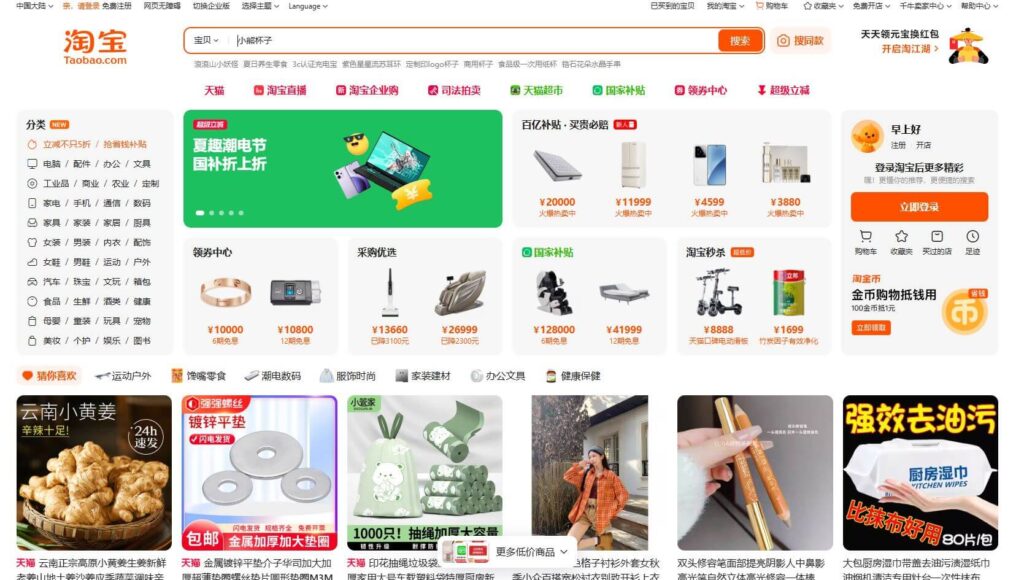
Taobao is another big name in Chinese e-commerce, but it’s mostly for individual buyers, unlike Alibaba, which focuses on businesses. Taobao offers low prices for single items, making it great for personal shopping.
On the other hand, Alibaba is better for bulk buying because it connects businesses directly with manufacturers. This often means lower prices for larger orders, which is why it’s so popular with businesses.
In terms of quality, both platforms have their risks. Taobao has more options for everyday consumers, but Alibaba lets buyers check suppliers and negotiate deals for bulk orders.
AliExpress
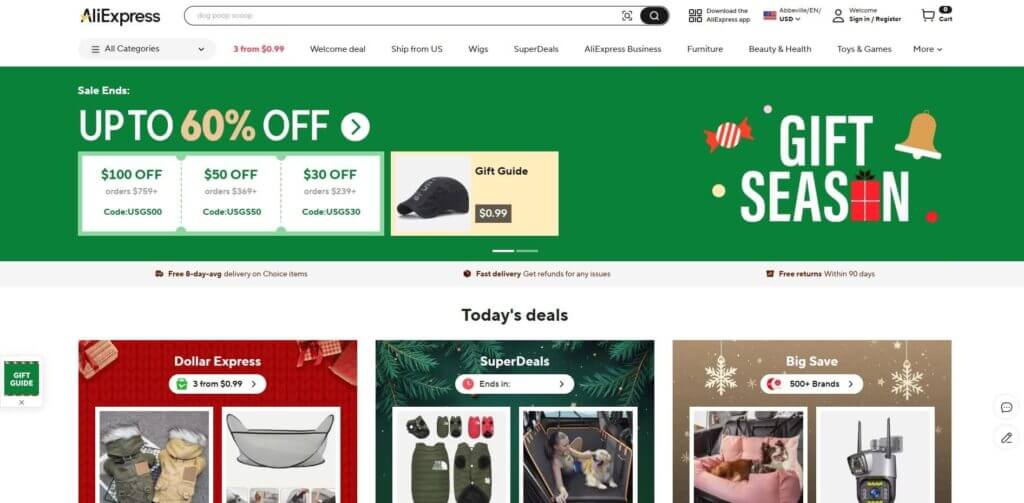
AliExpress is another B2C platform under the Alibaba Group. However, its prices are higher than Alibaba since its target audience are individual customers and not businesses.
The biggest advantage of AlIExpress is that most sellers do not have MOQ requirements.
In terms of quality, AliExpress provides buyer protection and a review system, making it easier for customers to feel confident in their purchases.
On the other hand, Alibaba requires buyers to carefully check suppliers and request samples since it’s meant for businesses buying in large quantities.
Tmall
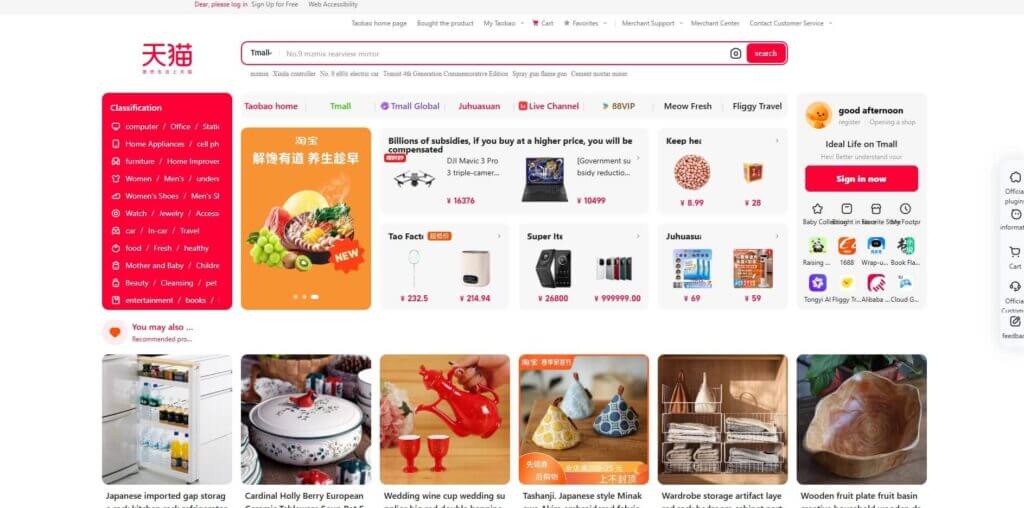
TMall is a premium e-commerce platform under the Alibaba Group. Unlike Alibaba’s B2B focus, TMall caters to individual buyers looking for high-quality, branded products.
The main difference from Alibaba is the type of sellers. TMall features verified brands and businesses, so its products are generally more reliable and come with better warranties.
This makes it a preferred choice for customers who prioritize quality and authenticity. But in terms of price, Alibaba is still obviously better.
Frequently Asked Questions
Is Alibaba Safe and Reliable?
Think of Alibaba as a huge online marketplace. Just like eBay or Amazon, there are reliable sellers… and some you’ll want to avoid. The platform itself is legitimate, but your experience depends on the supplier you choose.
To stay safe:
- Use Trade Assurance to protect your payment
- Stick to verified or Gold suppliers
- Request samples before placing large orders
- Avoid risky payment methods like Western Union
Like any large marketplace, your experience depends on how well you vet the seller. Many businesses source from Alibaba successfully, just don’t skip the homework.
Do Cheap Alibaba Products Have Good Quality?
Yes, many cheap products on Alibaba have good quality. However, you need to research and check the supplier’s reviews, ratings, and history before making a purchase.
Keep in mind that product quality can vary among different suppliers. Do not solely rely on the price as an indicator of quality.
Is It Safe to Buy Electronics from Alibaba?
It is generally safe to buy electronics from Alibaba, but you should do your due diligence. Look for reputable suppliers with high ratings, positive reviews, and ample experience.
It’s also a good idea to use Alibaba’s Trade Assurance program, which helps protect your purchases from potential fraud or quality issues.
Are the Branded Products on Alibaba Genuine?
Some branded products on Alibaba might be genuine, but there is also a risk of encountering counterfeit or knockoff products.
To minimize this risk, you should stick to reputable suppliers with high ratings and good reviews. Be cautious about deals that seem too good to be true, as they might indicate a fake product.
Why Do Alibaba and Amazon Have Different Prices?
Alibaba offers products at wholesale prices, while Amazon mainly operates as a retail platform.
As a result, products on Alibaba tend to have lower prices because they are often sold in bulk and directly from the manufacturer, without going through a middleman.
Additionally, Alibaba allows buyers to negotiate with suppliers, which can further reduce the price. On the other hand, Amazon adds its fees and commissions, leading to higher prices on most items.
What Are the Potential Risks of Shopping on Alibaba?
As with any online marketplace, there are risks when shopping on Alibaba, such as encountering counterfeit merchandise or dealing with unreliable suppliers.
However, these risks can be managed by choosing reputable, highly rated suppliers and using Alibaba’s Trade Assurance program, which safeguards transactions.
Also, be mindful of the shipping costs and customs regulations when importing goods, as these factors can affect the overall cost and experience.
Why Is Alibaba So Cheap: A Recap
Alibaba’s low prices come from several factors like bulk purchasing, cheaper production, shipping costs, and letting buyers connect directly with manufacturers.
These benefits make it a popular choice for businesses looking to source affordable products.
That said, low prices don’t always mean low quality. By doing proper research, checking supplier reviews, and ordering samples, you can find great products at a reasonable price.
Many successful online stores rely on Alibaba to source their inventory, showing that it’s a trustworthy platform that can help your business grow.
If you’re not happy with Alibaba’s prices or want better deals, we can help. At NicheSources, we make it easy to find reliable suppliers and get the best quotes. Request a free quote today and see how we can support your sourcing needs!
The post Why Is Alibaba So Cheap? How to Find Quality Products appeared first on NicheSources | Best China Sourcing Agent & Dropshipping Supplier since 2016.